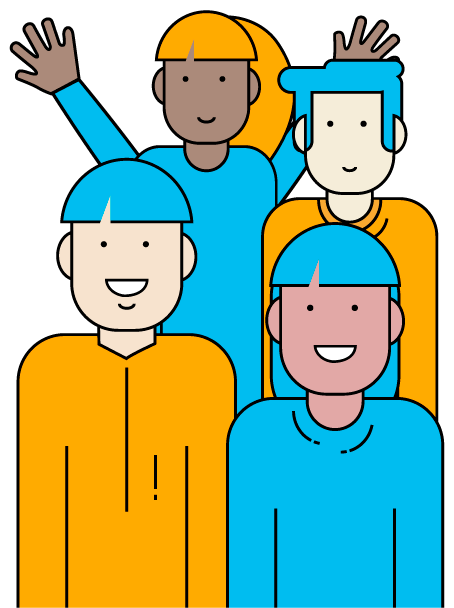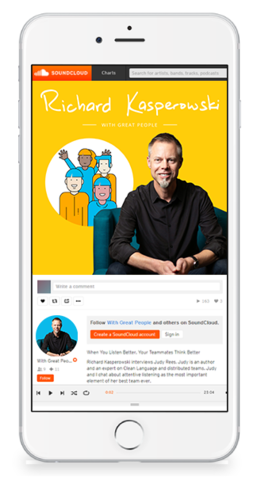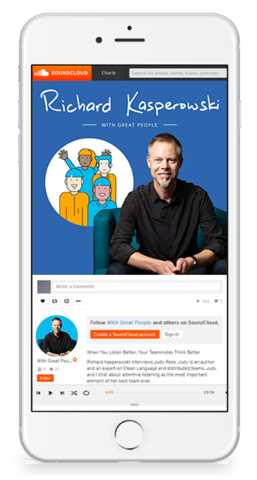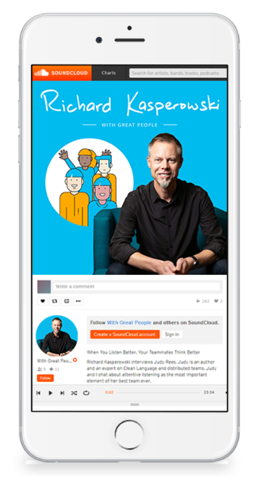Making Team Magic Happen
Richard Kasperowski interviews Michael Nir, a keynote speaker and bestselling author with expertise in Lean, Agile, and Gestalt. Michael shares his experience with a team of people from different walks of life, their intention to be part of a great team, and investing the time to make it happen. Learn more about Michael at https://michaelnir.com/.
Join hundreds of high-performers and subscribe to Richard’s newsletter at https://kasperowski.com.
Michael Nir: Making Team Magic Happen
with Michael Nir

TRANSCRIPT
Richard: 00:08 Hi friends. Welcome back to With Great People, the podcast for high performance teams. I’m Richard Kasperowski. This episode is an interview with Michael Nir. Michael is a keynote speaker and best-selling author with expertise in Lean, Agile, and Gestalt. Micheal and I discuss his best team ever. The team included people from all walks of life. They became a tight knit group of friends, open and accepting of each other. Intentionally making team magic happen.
Richard: 00:39 To support this podcast, sign up for my newsletter at kasperowski.com. Thanks for listening.
Richard: 00:48 Hi friends, and welcome back to With Great People. Our special guest today is Michael Nir. Michael is a speaker and author. Michael just released his tenth book, The Pragmatists Guide To Corporate Lean Strategy. Hi Michael, great to have you here.
Michael: 01:03 Hey Richard. So happy to join you here with great speakers.
Richard: 01:09 Is there anything you want to add on to that introduction?
Michael: 01:11 I think it was pretty solid. I do work on Lean and Agile and I work with teams all over and I really like my work.
Richard: 01:20 Alright cool. This is the podcast about great teams. The question I ask every guest, I ask every guest to talk about their best team ever. What is your best team ever?
Michael: 01:33 Richard, you actually asked me that about two months ago. I had a great answer and then I really thought about that and I forgot. Then you asked me about it today and I thought about it for a few minutes and I came with the exact same answer. I think it’s the correct answer if you could actually say it’s correct.
Richard: 01:51 This must be the one. Tell me about your best team ever.
Michael: 01:54 Years ago, and we are talking years ago I’m not going to date myself here, I was a youth hiking club counselor. We were taking kids on hikes in the desert. We’re talking Israel here where I grew up and spent quite a bit of time. We’re a group of counselors about eight or ten of them. We’re a team of counselors. I think that was the best team I was ever on.
Richard: 02:23 Take yourself back to this team. Try to relive the experience of being on that team. Maybe even close your eyes and meditate on that experience for a moment. There might be a sensation that you feel in your body as you sort of relive that team. Is there one word that you could use to describe the sensation of being part of that team?
Michael: 02:50 Great time.
Richard: 02:51 Great time. What else about great time?
Michael: 02:58 There was a lot of interest in one another. There was spending time together. I think non-judgemental, I would say. I’d say also the team was varied so different people. We weren’t all from the same background, same city, same place. We kind of happened to be at that point in time at the same place and we kind of melded, gelled together in a really cool way.
Richard: 03:28 Perfect. How do you know it was a great team? What were the subjective things that you can look back at when you identify it as your best team?
Michael: 03:40 We spent our discretionary time together. We just kept on doing that. We would hang out someplace. At one of our apartments and we would just spend days on end there and cook together and talk together and prepare for the next hikes together and help one another with getting the hikes right. Yeah.
Richard: 04:02 Cool. Okay so you spent a lot of time together, prepared meals together, did a lot of preparation together. Was there anything objective about the team? Something you could measure?
Michael: 04:14 You know that’s a great question, and again I’ll go back to two months ago when you’ve given me this hand out and I’m like “Wow, an objective thing. Oh my god.” I think it’s that kind of back of my head. I was like “What could be objective?” I think I got it. I really have a good answer now. I hope it is anyway. You’ll be the judge of that.
Michael: 04:35 The number of kids we had in our groups that we were leading, and we’re talking about ten groups, was high. You could see that our kids on the groups were happy to be a part of this group because they knew their counselors were happy to be part of that team of counselors. You could have more kids than was normally you know was the average I would say. I had usually 10, 12. I had maybe ongoing for that year about 16 or 17 kids. You know really didn’t want to… didn’t enjoy not always taking the kids out on hikes, but really did enjoy hanging out together with the counselors anyways.
Richard: 05:17 Alright, so you counselors were a great team. One of the metrics of that was sort of like the number of happy counselors and that was so obvious to the kids that you had a large number of happy kids and they were more attracted than usual. You had higher numbers than usual of happy kids in your groups.
Michael: 05:36 Yeah. Yeah I’d say yes. We were in our college. I was in my fourth year twenty years ago and we were all part about that same kind of age group. You know it’s just rockin’. It was just so much fun.
Richard: 05:53 My little trick worked. We pulled out twenty years ago from you, so now we know more about how old you are.
Michael: 05:59 Maybe twenty, maybe eighteen, maybe twenty two, I don’t really remember.
Richard: 06:08 Okay, so you offered a couple of concrete behaviors that your team of counselors engaged in. What other concrete behaviors were there that helped you melt together as a really great team?
Michael: 06:20 We definitely stood out for one another, so we helped out.
Richard: 06:26 What did helping out each other look like?
Michael: 06:27 For example, if I needed to prepare something for next week’s meeting with the kids I would ask someone else’s advice. I would give my advice. I would also give out prepared curriculum. We had to do this weekly outside of hiking, we had to do these weekly meet ups where we take them through some whatever. That whatever required a lot of preparation time. You know we just did that, a lot of that. I think one other thing is that people joined our team. We started at six. I think by the end of the year we were about maybe 14, 25 year old to 35 year old folks in one team that really gelled together well and were doing their job really well but also hanging out.
Michael: 07:18 I think other behaviors was definitely trust. There was a lot of trust there because you think about that. We were going out on four or five day overnight hikes kind of testing sometimes, taking risks. We needed to be there for one another in case things you know, I got stuck in the darkness once. We had to navigate out with the kids and you might get lost. Which happens you know. We’re talking your pre-GPS days and pre-cell phone days, so you really had to know one another well and help out and if you know nobody… if some team did not… one of the kids or group of kids not had to camp at night at the right time we went out and started looking for them. It happened quite often I have to say.
Michael: 08:00 We were responsible, you know I don’t want you thinking that we were totally irresponsible. I’m looking back, if I was a parent I’m not sure I would have sent my kid… never mind. That’s beside the point. We’re kind of a tangent here.
Richard: 08:16 You told me your son is going to be a camp counselor this summer. Are you going to repeat these sorts of things with his counselors group? [crosstalk 00:08:23]
Michael: 08:23 I don’t think so. I don’t think so. I think you know over the last twenty years the boundaries of how much you let go with all the technology around us. Parents will know where their kid is you know every half an hour. Back then you could go out for four or five days and they just wouldn’t know. It would freak me out today. Really.
Richard: 08:47 Let’s see, any other concrete behaviors? If not, that’s okay.
Michael: 08:55 I think I think I think it’s about that… it’s a long long time you know. Concrete behaviors for other things. Definitely the behavior, so the concrete behavior I do remember is our want or the fact that we were hanging out together and we organized our own excursions because we liked it so much. That was one thing that was definitely there.
Richard: 09:18 Alright alright. Organizing your own excursions, just spending a lot of time together. How about advice for our listeners? What can our listeners do to reproduce this sort of goodness on their teams?
Michael: 09:31 Here is another one of those questions that I really like because I wasn’t thinking about that. One of the interesting things is that that team was not homogenous. The people there that were from very different walks of life, so it wasn’t like all the people came from the same type of background. I would say that it was really more about one thing that we liked and we built on that. We decided that we want to make it happen. I think it’s really about intent. If I’m thinking about the business teams I’m working with now and helping them now become better and gel and work well together.
Michael: 10:10 I just had that experience yesterday with one of my clients in Indy. It was an interesting experience for me to sit and look at this seven person leadership team and how they interact with one another. I think there’s a little trust there and there is a lot of challenges with the team behavior. I’m talking about senior leaders here, these are not newbies to business.
Michael: 10:36 It really is about their intent. Do they want to be part of that team? Do they think that it will support their long term objectives? Is there someone there how is willing to create that bond and who will actually invest the effort to make it happen? I think if I reflect back about 18, 20 years ago we had a core team that said “We like it, we’re going to invest the effort, we’re going to put our time to that use and create that… ” it’s really magical. When it happens it’s magical. I have no other words for that. Teams that work well it’s so much more than the sum of the parts of the individuals. That’s like unbelievable.
Richard: 11:26 Alright, so invest the time into making that magic happen.
Michael: 11:29 Yes, and have the intent. Have the intent that that’s what you want right. You like and you want to have that.
Richard: 11:36 Got it. Have the intent that you want that magic to happen on your team and then invest the time to make it happen.
Michael: 11:42 Yeah, and be open to accept others. I think that’s a big one right, because you do have to accept that others are others right. They have their own experience and they have their own approach to how they do stuff.
Richard: 11:59 Yeah. Alright. Is there anything else you want to add?
Michael: 12:05 We didn’t mentioned and we started, I have this Gestalt background which I’ve been bringing to the table I would say the last twenty years or so. Gestalt is an approach to how individual… it’s a therapeutic approach for how individuals interact with the environment. I think a lot of team behaviors you can contract them back to how people interact with one another with their border of experience. I know it sounds a bit complex… you’re laughing and it’s like-
Richard: 12:37 No no this is great. When we first met was at a conference a few years ago. One of the things that interested me in you was this background in Gestalt.
Michael: 12:47 Yeah.
Richard: 12:48 Do I even saying that right?
Michael: 12:49 Gestalt yeah, it’s a german word. It’s a german word for structure right. There’s Gestalt ecology, Gestalt therapy, and we could talk about that a lot. Now it’s Qconn, and I remember you had done the open space and I was like “Wow, this is so much Gestalt here.” The entire interaction, so I got to hang out with that Richard dude. Then I came to Boston and I reached out and we met. You got a fine for illegal parking at the day that was the snowiest day in 2015.
Richard: 13:18 In a blizzard.
Michael: 13:19 In a blizzard yes. That was amusing. It’s funny.
Richard: 13:24 The smile on my face is your teaching me about Gestalt right not. You know I’ve looked it up, I’ve read about it. I haven’t figured out how to study it well. I just love this introduction to it.
Michael: 13:38 Yeah, and we had… you’re right. You can’t really explain Gestalt. You know at the last Agile games, Agile New England I was doing the one hour session and it really was doing Gestalt exercise. The funny thing is you can never understand it until you experience it and have taken the participants through an hour of that experience and then we’re doing the retrospective and they were like “Oh, so that’s what happened now for the last 60 minutes. Now it all connects. Now we understand what was the thing that we were going through.”
Michael: 14:13 A lot of the Gestalt concepts are ingrained in how teams work.
Richard: 14:18 Alright. Definitely something for me to learn more about. If our listeners want to learn more about that or they want to contact you for anything at all, how can they contact you?
Michael: 14:29 Just drop me an email. I can say that right, just drop me an email. Some of these that work. With a baseball, the baseball is the left field, I think I’m getting the hang of it. Someone said that, drop me a line.
Richard: 14:46 Alright so they can pitch an email to you and you’ll bat or reply right back.
Michael: 14:51 Exactly. My new email with the new website is Michael@michaelnir.com. Michael Nir in one word, and Nir is N-I-R. Got that right.
Richard: 15:03 We’ll put that in the podcast description to make it easy for people.
Michael: 15:05 Great.
Richard: 15:06 Michael Nir, thank you very much for joining us today. We had a really nice walk before we came down to the secret underground studio. I really appreciate all the time we spent together today.
Michael: 15:16 Thanks for having me Richard.
Richard: 15:19 Hi friends. Thanks for listening, and remember to support this podcast sign up for my newsletter at kasperowski.com.






